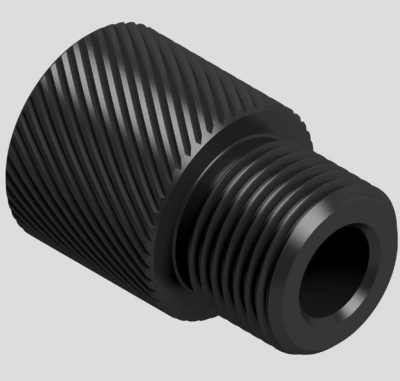OUTLINE:
Something you Need to Know about Oil Filter Suppressor
 239
239Curious about the clandestine world of oil filter suppressors?
Our guide, "Insider Insights: Understanding the Essentials of Oil Filter Suppressors," unveils the mysteries surrounding this controversial topic.
Delve deep into the realm of suppressor technology as we provide an insider's perspective on the crucial aspects you need to know.
From their construction and functionality to the legalities and practical applications, are you ready to uncover the truth behind oil filter suppressors?

Image Source: Adaptateur & Silencieux
What Does An Oil Filter Suppressor Mean about
An oil filter suppressor typically refers to a homemade firearm suppressor constructed from readily available materials, primarily an automotive oil filter.
These makeshift suppressors are often used by individuals seeking to reduce the noise generated by firing a firearm.
However, the use of oil filter suppressors raises significant legal and safety concerns.
While they may dampen the sound of gunfire to some extent, they are not designed or regulated for such purposes, potentially resulting in unpredictable and dangerous outcomes.
Additionally, their construction and possession may violate firearms laws and regulations in many jurisdictions.
Therefore, the use of oil filter suppressors should be approached with caution and an understanding of the legal implications involved.
How Does An Oil Filter Suppressor Work
An oil filter suppressor typically functions by exploiting the design of an automotive oil filter to reduce the noise generated by firing a firearm.
The suppressor is constructed by attaching the oil filter to the muzzle of the firearm, allowing the expanding gasses produced by the combustion of gunpowder to be partially contained and dispersed within the filter's internal chamber.
As these gasses pass through the filter medium, they undergo a process of diffusion and absorption, which helps to attenuate the sound of the gunshot.
Additionally, the internal baffles and chambers within the oil filter may further disrupt and redirect the flow of gasses, contributing to the suppression of noise.
However, it's important to note that oil filter suppressors are not designed or engineered for this purpose, and their effectiveness can vary widely.
Moreover, their use may pose significant safety risks and legal consequences.
Advice for Using An Oil Filter Suppressor
Using an oil filter suppressor presents numerous risks and legal implications.
However, if one chooses to proceed despite these factors, several precautions should be considered:
Understand Legalities: Research and comprehend the laws and regulations governing firearm suppressors in your jurisdiction. Using an oil filter suppressor may violate local, state, or federal laws, leading to severe legal consequences.
Safety First: Prioritize safety at all times. Recognize that oil filter suppressors are not designed or tested for firearm use, potentially leading to malfunctions, misfires, or catastrophic failures.
Quality of Materials: Exercise caution when selecting materials for construction. Low-quality or incompatible components may compromise the effectiveness and safety of the suppressor.
Regular Inspection: Conduct regular inspections of the suppressor to identify signs of wear, damage, or degradation. Replace any components showing signs of deterioration to mitigate risks.
Use with Caution: Exercise extreme caution when using an oil filter suppressor. Be aware of the limitations and potential hazards associated with makeshift suppressors, and take appropriate safety measures.
Legal Consequences: Understand the legal ramifications of possessing and using an oil filter suppressor. Engaging in illegal activities or violating firearms laws can result in severe penalties, including fines, imprisonment, and loss of firearm rights.
Seek Legal Advice: Consult with legal experts or firearm professionals to obtain accurate information and guidance regarding the use of suppressors in your jurisdiction.
Do Oil Filters Actually Work as Suppressors[FAQ]
Using oil filters as firearm suppressors is illegal and highly dangerous.
While some individuals may attempt to use oil filters as makeshift suppressors, they are not designed or intended for this purpose.
Additionally, modifying an oil filter for such use may violate firearms laws and regulations in many jurisdictions.
Moreover, makeshift suppressors pose significant safety risks, including the potential for malfunctions, explosions, and injuries.
It's essential to prioritize safety and compliance with firearms laws at all times.
Individuals seeking suppressors for firearms should explore legal options for obtaining commercially manufactured suppressors through authorized channels.
Remember, safety, responsibility, and adherence to the law should always be top priorities.
Final Verdict
It's crucial to recognize that while oil filter suppressors may be a topic of curiosity, they present significant legal and safety concerns.
Understanding the essentials of oil filter suppressors includes acknowledging their illegal and hazardous nature.
Attempting to construct or use oil filter suppressors can result in severe legal consequences and pose serious risks to oneself and others.
Instead, individuals interested in firearm suppressors should explore legal and regulated options through authorized channels.
Remember, safety, responsibility, and adherence to the law are paramount considerations when it comes to firearms and related accessories.

Disclaimer: The views and opinions expressed by individual authors or forum participants on this website do not represent the views and opinions of Chipsmall, nor do they represent Chipsmall's official policy.

share this blog to:

